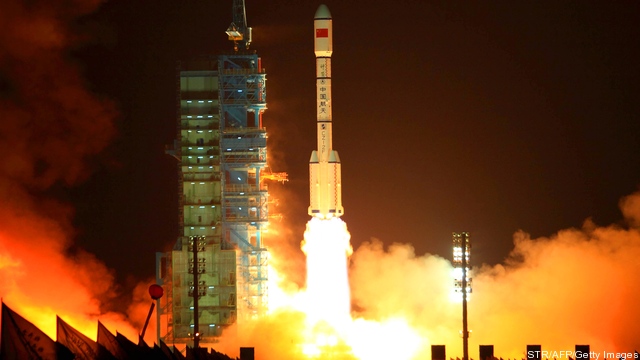US-China Commission Study Urges Tougher Space Cooperation Restrictions

China’s Long March 25 rocket
UPDATED TO REFLECT THE OUTSOURCED NATURE OF THE STUDY. WASHINGTON: Congress should double down on legislative efforts to prevent the transfer of US tech and know-how to China’s space program, including ordering DoD to produce an annual, unclassified report on the PLA’s counterspace programs, says a report published by the U.S.-China Economic and Security Review Commission.
“Congress should enact new or enhance existing laws to prohibit U.S. government departments and agencies, national labs, universities, companies, fund managers, and individual investors from supporting China’s space program and activities that are inherently military in nature,” recommends the study, called “China’s Space and Counterspace Capabilities and Activities.” UPDATE BEGINS. It was authored by Project 2049 Institute and Pointe Bello at the request of the commission, a spokesperson said in an email, and does not necessarily reflect the commission’s views. UPDATE ENDS.
In the eyes of the authors pretty much all of China’s space activities are military related.
“According to Chinese government sources, China’s national space program is largely managed by the PLA, and Chinese space assets are probably assigned as either military or dual-use (military-civil) assets to be mobilized in the event of a crisis or war,” the study warns.
“The report seems to push for even less space cooperation with China than currently exists, due to limitations imposed by Congress in 2011, even though the most pressing current space issue — debris — can only be addressed cooperatively,” Joan Johnson-Freese, a professor at the Naval Warfare College, said in an email to Breaking D. “Ham-fisted US policy has proven counterproductive in the past, and will likely continue to do so in the future.”
Indeed, the study urges Congress to smack down almost any interaction by any US entity — including private companies and universities — with China on any aspect of space activities.
For example, the authors raises their metaphorical eyebrows at the bilateral research agreement between Beijing Institute of Technology’s (BIT) Institute of International Law and George Washington University’s (GWU) Elliott School of International Affairs. The two organizations signed a cooperation agreement in September 2013, and their joint study program largely focuses on the development of norms and international space governance.
The study characterizes BIT’s involvement as “actively working to shape research and promote PRC standards in international space law,” and ominously notes that GWU’s Space Policy Institute has support of a wide variety of “important U.S. defense contractors and federally funded R&D centers.”
“While I agree with their concerns about technology transfer and funding PLA space programs, highlighting a space law relationship between GWU and BIT as a potential concern is a stretch,” said Brian Weeden, director of program planning at Secure World Foundation, in an email to Breaking D today.
“I think it’s actually to the benefit of the United States that we have a dialogue with China on space law and policy and, potentially, a channel to encourage China to adhere to international laws and norms,” he added.
Secure World Foundation authors an unclassified annual report on counterspace technology development around the world, which includes a detailed section on the state of China’s capabilities. The 2020 version of that report found that: “The evidence strongly indicates that China has a sustained effort to develop a broad range of counterspace capabilities.”
The study, which wrapped up work prior to the establishment of the Space Force in December, offers seven more recommendations on aimed at containing China’s development as a space power, and pumping up the ability of the United States to keep ahead of Beijing’s progress. These include:
- Congress should consider mandating and funding the production of a routinely updated, publicly available list of entities supporting China’s space programs and activities.
- Congress should consider mandating and funding public education to enhance general knowledge of China’s space programs and activities, including more targeted congressional hearings and the allocation of grants for thinktank and university research programs, public conferences, public-private consultative talks, and media outreach.
- Congress should consider reviewing the budgets of the National Aeronautics and Space Administration and the United States’ leading aerospace university programs to ensure they have the education funding necessary to support young and emerging scientists and
echnology innovators. - Congress should pass legislation that incentivizes science, technology, engineering, and mathematics-focused high-skilled labor immigration from China (as well as other countries), including special visas earmarked for these students and a public-private effort to find them work.
- Congress should direct the U.S. Department of Defense to produce an annual unclassified report on PLA space/counterspace developments and other major players in space security. This report should assess developments, setbacks, and efficacy of these powers’ space programs. The report should also outline methodologies to assess the source of sub-kinetic attacks on U.S. space assets and potential military responses. In addition, it should assess the vulnerabilities of U.S. space/counterspace systems and how best to improve U.S. space systems’ survivability in the event of disruption or conflict.